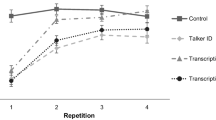Abstract
Recent data suggest that the first presentation of a foreign accent triggers a delay in word identification, followed by a subsequent adaptation. This study examines under what conditions the delay resumes to baseline level. The delay will be experimentally induced by the presentation of sentences spoken to listeners in a foreign or a regional accent as part of a lexical decision task for words placed at the end of sentences. Using a blocked design of accents presentation, Experiment 1 shows that accent changes cause a temporary perturbation in reaction times, followed by a smaller but long-lasting delay. Experiment 2 shows that the initial perturbation is dependent on participants’ expectations about the task. Experiment 3 confirms that the subsequent long-lasting delay in word identification does not habituate after repeated exposure to the same accent. Results suggest that comprehensibility of accented speech, as measured by reaction times, does not benefit from accent exposure, contrary to intelligibility.
Similar content being viewed by others
References
Adank, P., & McQueen, J. M. (2007). The effect of an unfamiliar regional accent on word comprehension. Paper presented at the ICPhS XVI, Saarbrucken, 6–10 August.
Arslan L.M., Hansen J.H.L. (1996) Language accent classification in American English. Speech Communication 18: 353–367
Balota, D. A., Cortese, M. J., Hutchison, K. A., Neely, J. H., Nelson, D., Simpson, G. B., et al. (2002). The English Lexicon Project: A web-based repository of descriptive and behavioral measures for 40,481 English words and nonwords. Washington University. http://elexicon.wustl.edu/.
Bent T., Bradlow A.R. (2003) The interlanguage speech intelligibility benefit. The Journal of the Acoustical Society of America 114: 1600–1610
Bradlow A.R., Bent T. (2003) Listener adaptation to foreign accented English. In: Sole M.J., Recasens D., Romero J. (eds) Proceedings of the XVth International Congress of Phonetic Sciences. Barcelona, Spain, pp 2881–2884
Chambers J.K. (1992) Regional accent acquisition. Language 68(4): 673–705
Clarke C.M. (2000) Perceptual adjustment to foreign-accented English. The Journal of the Acoustical Society of America 107: 2856
Clarke C.M., Garrett M.F. (2004) Rapid adaptation to foreign-accented English. The Journal of the Acoustical Society of America 116: 3647–3658
Derwing T.M., Munro M.J. (1997) Accent, intelligibility and comprehensibility. Studies in Second Language Acquisition 19: 1–16
Duyck W., Desmet T., Verbeke L., Brysbaert M. (2004) WordGen: A tool for word selection and non-word generation in Dutch, German, English, and French. Behavior Research Methods, Instruments, & Computers 36(3): 488–499
Flege J.E. (1984) The detection of French accent by American listeners. Journal of the Acoustical Society of America 76(3): 692–707
Flege J.E. (1995) Second language speech learning: Theory, findings and problems. In: Strange W. (eds) Speech perception and linguistic experience: Theoretical and methodological issues. York Press, Baltimore, pp 233–277
Floccia C., Goslin J., Girard F., Konopczynski G. (2006) Does a regional accent perturb speech processing?. Journal of Experimental Psychology: Human Perception and Performance 32: 1276–1293
Gass S., Varonis E. (1984) The effect of familiarity on the comprehensibility of non-native speech. Language Learning 34: 66–85
Hughes A., Trudgill P. (1979) English accents and regional accents. Edward Arnold, London
Jongman, A., Wade, T., & Sereno, J. (2003). On improving the perception of foreign-accented speech. In M. J. Sole, D. Recasens, & J. Romero (Eds.), Proceedings of the 15th International Congress of Phonetic Sciences (pp. 1561–1564).
Ladefoged P. (2005) A course in phonetics (5th ed). Heinle, Belmont, CA
Lahiri A., Marslen-Wilson W. (1991) The mental representation of lexical form: A phonological approach to the recognition lexicon. Cognition 38: 245–294
Lane H. (1963) Foreign accent and speech distortion. Journal of the Acoustical Society of America 35: 451–453
Laver J. (1994) Principles of phonetics. Cambridge University Press, Cambridge
Livescu, K., & Glass, J. (2000). Lexical modelling of non-native speech for automatic speech recognition. Proceedings of ICASSP.
Lorch R.F., Myers J.L. (1990) Regression analyses of repeated measures data in cognitive research. Journal of Experimental Psychology: Learning, Memory, and Cognition 16: 149–157
Munro M.J., Derwing T.G. (1995) Processing time, accent and comprehensibility in the perception of native and foreign-accented speech. Language and Speech 38: 289–306
Norris D., McQueen J.M., Cutler A. (2003) Perceptual learning in speech. Cognitive Psychology 47(2): 204–238
Pallier C., Colomé A., Sebastian-Gallès N. (2001) The influence of native-language phonology on lexical access: Concrete exemplar-based vs. abstract lexical entries. Psychological Science 12(6): 445–449
Shmid P.M., Yeni-Komshian G.H. (1999) The effects of speaker accent and target predictability on perception of mispronunciations. Journal of Speech, Language and Hearing Research 42: 56–64
Trudgill P. (1986) Regional accents in contact. Basil Blackwell, Oxford
Trudgill P., Hannah J. (1985) International English: A guide to varieties of standard English. Edward Arnold, London
Upton, C., & Widdowson, J. D. A. (1996). An atlas of English regional accents. Oxford University Press.
van Wijngaarden S.J. (2001) Intelligibility of native and non-native Dutch speech. Speech Communication 35: 103–114
Wardhaugh R. (1992) An introduction to sociolinguistics (2nd ed). Blackwell, Oxford
Weil S.A. (2001) Foreign accented speech: Encoding and generalization. The Journal of the Acoustical Society of America 109(5): 2473
Weil, S. A. (2003). The impact of perceptual dissimilarity on the perception of foreign accented speech. Unpublished dissertation, The Ohio State University.
Wells J.C. (1982) Accents of English, volume 1: An introduction. Cambridge University Press, Cambridge
Wingstedt M., Schulman R. (1987) Comprehension of foreign accents. In: Dressler W. (eds) Phonologica 1984: Proceedings of the Fifth International Phonology Meeting. Cambridge University Press, Cambridge, pp 339–345
Author information
Authors and Affiliations
Corresponding author
Rights and permissions
About this article
Cite this article
Floccia, C., Butler, J., Goslin, J. et al. Regional and Foreign Accent Processing in English: Can Listeners Adapt?. J Psycholinguist Res 38, 379–412 (2009). https://doi.org/10.1007/s10936-008-9097-8
Received:
Accepted:
Published:
Issue Date:
DOI: https://doi.org/10.1007/s10936-008-9097-8




